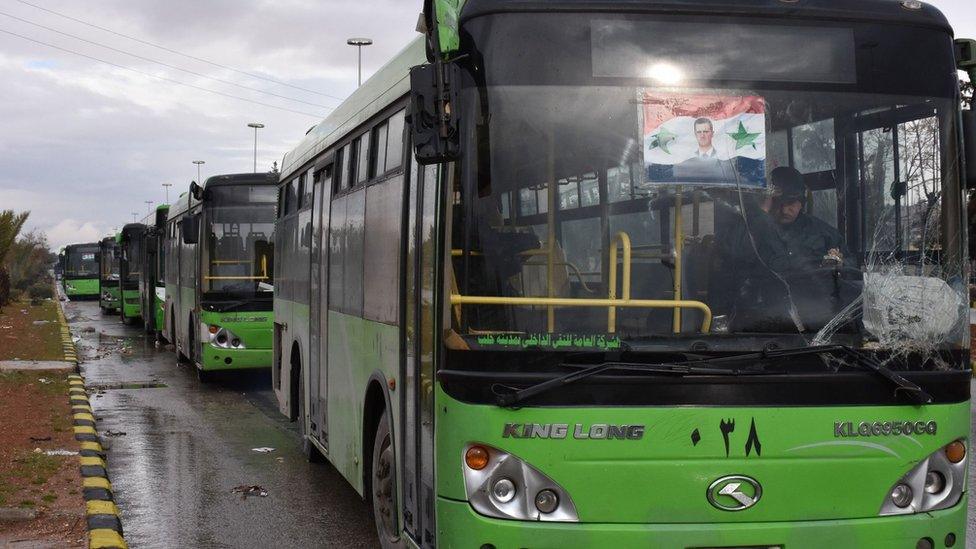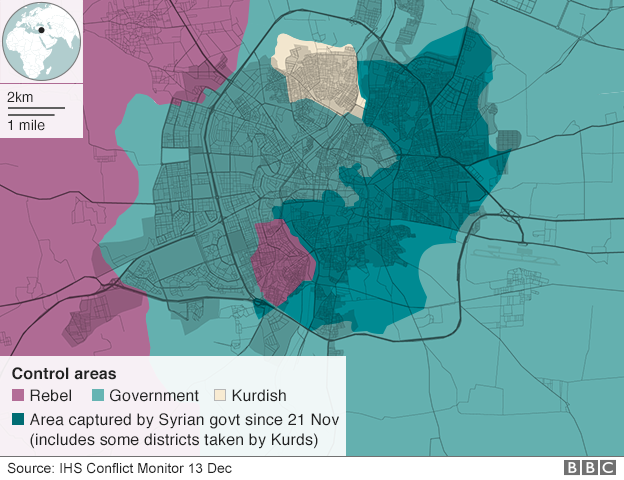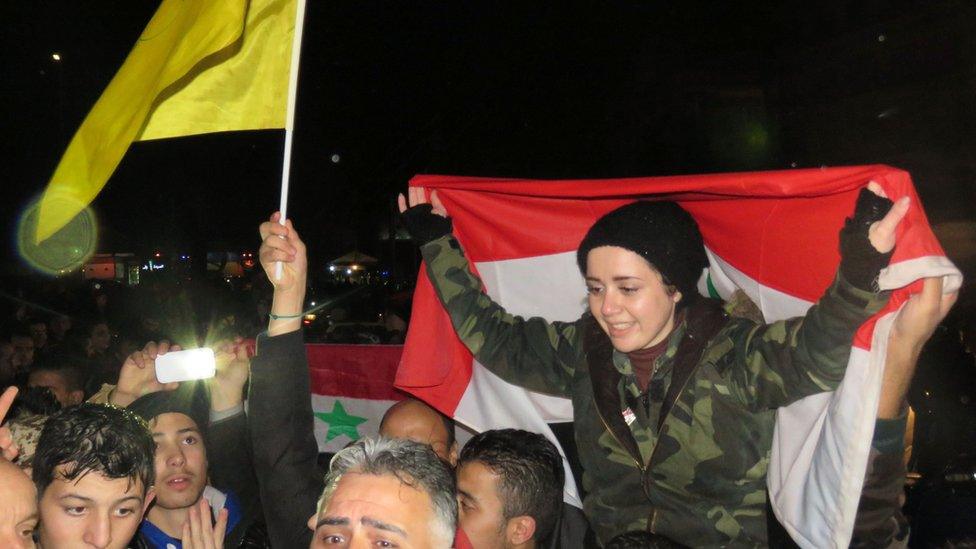Aleppo battle: Rebel evacuation delayed
- Published

Buses were brought in but have not been used
The planned evacuation of rebel fighters and civilians from devastated eastern Aleppo has been delayed.
The Syrian government is said to be demanding the evacuation of its injured fighters and civilians from nearby towns encircled by opposition forces.
A ceasefire was declared in Aleppo on Tuesday and held overnight, but fresh shelling was reported on Wednesday.
Russia's foreign minister said he expected rebel resistance to continue for "the next two to three days".
Activists and civilians told the BBC parts of eastern Aleppo were shelled on Wednesday morning. Ibrahim Abu-Laith, a spokesman for the White Helmets volunteer rescue group, said more than 40 people were injured.
Russia - Syria's ally - said the Syrian army resumed firing after the rebels broke the truce.
Eastern Aleppo has been held by the rebels since 2012. But the rebels had been squeezed into ever smaller areas of the city in recent months by a major government offensive, backed by Russian air power.

Late on Tuesday, Russian ambassador to the UN Vitaly Churkin told an emergency session of the UN Security Council: "According to the latest information that we received in the last hour, military actions in eastern Aleppo are over."
Under the evacuation deal, brokered by Turkey and Russia, civilians and rebels from eastern Aleppo are to be evacuated to rebel-held areas in northern Syria.
Evacuations had been due to start at 05:00 (03:00 GMT), reports said, but several hours later the fleet of government buses had not moved.
The UN says it is "not involved" in the evacuation plans but "stands ready to facilitate the voluntary and safe evacuation of injured, sick and vulnerable civilians from the besieged part of the city".
On Tuesday, UN Special Envoy for Syria Staffan de Mistura called for immediate access to oversee operations.
"Here comes the barrel bomb" - trapped resident Joud al-Khatib in Aleppo
News of the evacuation deal came as the UN reported summary killings by pro-government forces.
It said it had reliable evidence that in four areas 82 civilians were killed, adding that many more may have died.
The UN and the US said the Syrian government as well as Russia and Iran - another key ally of Syrian President Assad - were accountable for any atrocities committed in the city. Syria's government and Russia said the allegations were untrue.
On Wednesday, in an interview with Russian media, Syrian President Bashar al-Assad accused the West of double standards.
He said officials and media expressed concern about civilians when the government was advancing in Aleppo, but did not care when Islamist rebels attacked civilians and heritage in Palmyra.
Samantha Power asked Syria and its allies : "Are you truly incapable of shame?"
Meanwhile, in a fiery exchange at the UN, US Ambassador Samantha Power accused Syria and its allies of contributing to "a noose around civilians". "Are you truly incapable of shame?" she asked.

Extraordinary turnaround: By BBC defence and diplomatic correspondent Jonathan Marcus

On Monday, Syrians in western Aleppo celebrated the prospect of an imminent victory in the east
The seizure of the eastern part of the city by government forces and the crushing of the rebel enclave there represents a major propaganda victory for the government of President Bashar al-Assad, which now controls virtually all of the major population centres of the country.
But Aleppo - the most populous city before the civil war and the country's financial centre - is the biggest prize.
Its capture represents a victory not just for Mr Assad but also for his Iranian and Russian backers.
Aleppo itself may not matter much on Moscow's strategic chess-board. But the defeat of the rebel opposition there underscores the extraordinary turn-around in President Assad's fortunes.
Before Russia intervened President Assad was on the ropes, his military power crumbling.
External actors have propped up his government in large part to secure their own strategic aspirations. And these aspirations will play an important part in deciding what comes next.

What is the situation in the rebel areas?
Before the end to hostilities was announced, the rebels had retreated into just a handful of neighbourhoods.
Aleppo MP Fares Shehabi denied government forces were committing atrocities
As rebels are pushed out of eastern Aleppo, one resident explains why many civilians are unable to escape.
It is hard to know exactly how many people are in the besieged areas, although UN envoy Staffan de Mistura put the figure at about 50,000.
He said there were approximately 1,500 rebel fighters, about 30% of whom were from the jihadist group formerly known as the al-Nusra Front.
Other local sources say there could be as many as 100,000 people, many of them arriving from areas recently taken by the government.
Ibrahim Abu-Laith said only one medical point was still working in the besieged areas. There was no first aid equipment left, he added.
He said volunteers were using their hands to pull people out of rubble, but some 70 people were stuck and could not be extracted.

What does this mean for the civil war?
This is a huge blow to the armed opposition, and a major victory for the Russians, the Iranians, Lebanon's Hezbollah and some Iraqi Shia militias.
But the rebels still control quite large areas, as do the jihadists of so-called Islamic State. So in terms of Syria itself the war continues.
The BBC's Middle East editor Jeremy Bowen says it will be a different type of war - less rebels trying to hold territory and create their own entity, more hit-and-run and insurgency.
How did Aleppo reach this point?
For much of the past four years, Aleppo has been divided roughly in two, with the government controlling the western half and rebels the east.
Syrian troops finally broke the deadlock with the help of Iranian-backed militias and Russian air strikes, reinstating a siege on the east in early September and launching an all-out assault weeks later.